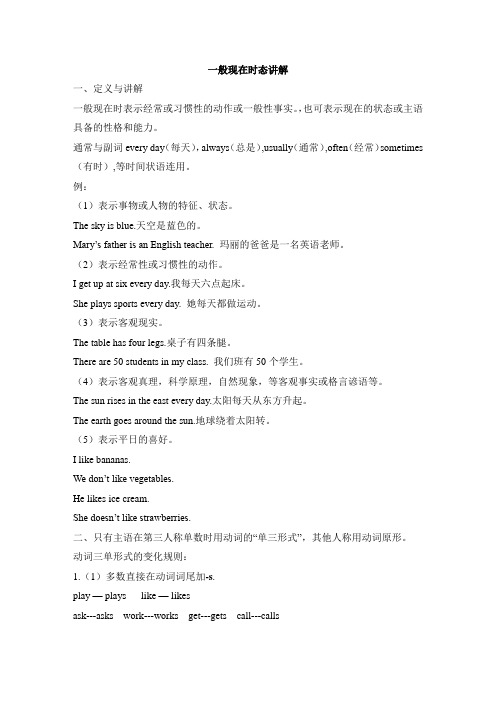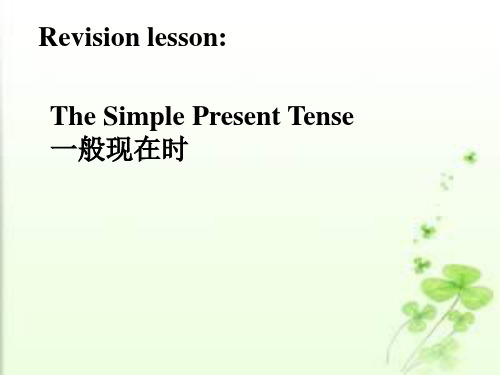七年级英语上册 一般现在时课件 外研版
外研英语初一上学期一般现在时的复习(PPT)5-1

Do you remember the words in your life? 你记得你生活中的一些常用词汇吗?
起床 吃早饭 上课 吃午饭 休息做运动 吃晚餐 做家庭作业 看电视 上床睡觉
get up have breakfast start lesson have lunch have a break do sports have dinner do homework watch TV go to bed
always
usually
HIe often
sometimes never
readsnnoovveelsls listenstotoththeemmuusiscic goetsottohtehceinceinmeama goetsottohtehceocnocnecretrt goetsotwo awtachtcthhtehfeoofotbotabllamll amtcahtch playsggaammeess playsththeeppiaiannoo goeosnolinnleine speaksEEnngglilsihsh goetsottohtehpeaprakrk
望:~师母。 【拜物教】名①原始宗教的一种形式,把某些东西(如石头、树木、弓箭等)当做神灵崇拜,无一定的组织形式。②比喻对某种事物的迷信:
商品~。 【拜谢】动敬辞,感谢:登门~。 【拜谒】动①拜见:专诚~。②瞻仰(陵墓、碑碣):~黄帝陵。 【稗】①名稗子。②〈书〉
2:Talk about the things you always/ usually /often /sometimes/never do in your life.
打~|吃了一个大~。 【败阵】∥动在阵地上被打败:~而逃|败下阵来◇甲队最后以二比三~。 【败子】名败家子:~回头(败家子觉悟悔改)。 【败走】 动作战失败而逃(往某地),也指在某地比赛或竞争失败。后面多跟地名。 【拜】①动行礼表示敬意:回~|叩~|对着遗像~了三拜。②见面行礼表示祝
外研版七年级上册英语: 实义动词一般现在时复习课件

• 表示个人___爱__好_______、_____习__惯________
They like football.
playing
I like drawing pictures
表示___客_观__真_理________或___或_自__然_现__象___________
基本结构
三单主语
肯定句:主语+实义动词第三人称单数+其他 He likesLeabharlann playing football.
否定句:主语+ ___d_o_e_s_n_'t_____ + 实义动词原形+其他 does not
He doesn't like playing football.
三单主语
一般疑问句:____D_o_e_s___+主语+实义动词原形+其他?
comes
drives
come________ drive________
• write_w_r_i_t_e_s__ let____l_e_t_s_
watch_w_a_t_c_h_e_s_
• finish_f_i_n_i_s_h_e_s teach_t_e_a_c_h_e_s_ go___g_o_e_s__
The sun rises from the east and sets in the west.
The moon goes around the earth.
第三人称单数
第三人称单数主语
• 人称代词he , she , it • 单个人名、地名、河、湖、海 • 单数名词和不可数名词
a gril
外研版英语七年级上册Module 7 一般现在时态讲解

一般现在时态讲解一、定义与讲解一般现在时表示经常或习惯性的动作或一般性事实。
,也可表示现在的状态或主语具备的性格和能力。
通常与副词every day(每天),always(总是),usually(通常),often(经常)sometimes (有时),等时间状语连用。
例:(1)表示事物或人物的特征、状态。
The sky is blue.天空是蓝色的。
Mary’s father is an English teacher. 玛丽的爸爸是一名英语老师。
(2)表示经常性或习惯性的动作。
I get up at six every day.我每天六点起床。
She plays sports every day. 她每天都做运动。
(3)表示客观现实。
The table has four legs.桌子有四条腿。
There are 50 students in my class. 我们班有50个学生。
(4)表示客观真理,科学原理,自然现象,等客观事实或格言谚语等。
The sun rises in the east every day.太阳每天从东方升起。
The earth goes around the sun.地球绕着太阳转。
(5)表示平日的喜好。
I like bananas.We don’t like vegetables.He likes ice cream.She doesn’t like strawberries.二、只有主语在第三人称单数时用动词的“单三形式”,其他人称用动词原形。
动词三单形式的变化规则:1.(1)多数直接在动词词尾加-s.play — plays like — likesask---asks work---works get---gets call---calls(2)以字母s, x, ch, sh或o结尾的动词,在词尾直接加-es.watch---watches wish---wishes do---does go---goes(3)以“辅音字母加- y”结尾的动词,要先变y为i再加-es.try---tries study---studies cry---cries fly---flies2.不规则变化:be---- is have----has三、一般现在时的句子转换:(1)变一般疑问句:当句子中有be动词或情态动词时,则把be动词或情态动词(can, could等)提到主语的前面,(口诀:一调二变三问号);(2)变否定句:在be动词或情态动词后面直接加not变成否定句. (be后not莫忘记)例:①陈述句:She is my sister.疑问句→ Is she your sister? Yes,I am. / No, I’m not.否定句→ She is not my sister.②陈述句:I can play soccer.疑问句→ C an you play soccer? Yes, I can. / No, I can’t.否定句→ I can’t play soccer.注意:对一般疑问句的回答:一般用什么问就用什么来回答。
初中英语一般现在时动词用法课件ppt(36张)

2 一般性的事实或者真理。
The sun rise in the east. 太阳从东方升起 The earth is round. 地球是圆的。
-What do you do?
-What do you do?
-I ...
- I ...
-What do I do?
-What do you do?
I go to school every day.
I do my homework every day.
I go to bed at 9:00.
二、实义动词
Know-point 2
1、实义动词的概念 实义动词,即行为动词,表示动作的动词。
I play basketball.
She wears a beautiful skirt.
三、动词的第三人称单数形式变化规则
1、一般由动词原形加-s walk-walks write-writes like-likes
写出下列词汇的第三人称单数形式:
talk say
______ ______
look __, sh结尾的动词加-es wash- washes watch-watches finish- finishes
—Do you eat every morning? —Yes, I do./No, I don't.
—Does she have a little brother? —Yes, she does./No, she doesn't.
翻译下列句子并作肯定否定回答
1 你们喜欢打篮球吗? 2 他在9点前睡觉吗? 3 Mary 是美国人吗?
It is a dog.
They are scientists.
精美课件PPT 七年级英语上册 一般现在时课件

4.Do they do their homework every day? Does Kitty do her homework every day?
动词第三人称单数的构成
句型转换
1. She does the housework on Sundays.(否定句) She doesn’t do the housework on Sundays.
2. We have an English lesson every day.(一般疑问句) Do you have an English lesson every day?
疑问句 Are you/we/they……? Is he/she/it……?
肯定句
• I am an English teacher. • I am Millie. • It is a big school. • He is polite. • Sandy is from China. • We are in Class One Grade Seven. • Mrs Fang and Mr Fang are doctors. • The girls are in the classroom.
Welcome to my class
一般现在时
Simple present tense
一般现在时的用法
1、表示现在的事实、状态或动作. Millie lives in Beijing. I live in Rugao.
2、表示习惯性动作,常与sometimes , often, every day,always, usually等时间状语连用
外研版七年级英语上册课件ModuleUnit4

1 We have maths after __b_r_ea_k____ today. 2 I like maths. It’s my favourite _s_u_b_je_c_t__.
because break homework interesting subject
外研版七年级英语上册课件 Module 5 Unit 3(共29张PPT)
外研版七年级英语上册课件 Module 5 Unit 3(共29张PPT)
• 我晚上做我的家庭作业。 I do homework in the evening.
• 我不在晚上做我的家庭作业。 I don’t do my homework in the evening.
4 I get up __a_t__ seven o’clock. 5 We go home __in___ the afternoon. 6 We have dinner __a_t__ half past six.
5 Complete the sentences with the words from the box.
do homework get up go to school have a break have breakfast have lunch start work
In the afternoon, we have two lessons and go home at half past three. I don’t (7) d__o_h_o_m__e_w_o_r_k_ on Friday evening. I do it on Saturday.
外研版七年级英语上册课件 Module 5 Unit 3(共29张PPT)
英语:外研版七年级上上一般现在时的复习课件

3.They go swimming on Sundays.
They don’t go swimming on Sundays. Do they go swimming on Sundays? Yes ,they do/No , they
at…
2:Talk about the things you always/ usually /often /sometimes/never do in your life.
always
usually
HIe often
sometimes never
readsnnoovveelsls listenstotoththeemmuusiscic goetsottohtehceinceinmeama goetsottohtehceocnocnecretrt goetsotwo awtachtcthhtehfeoofotbotabllamll amtcahtch playsggaammeess playsththeeppiaiannoo goeosnolinnleine speaksEEnngglilsihsh goetsottohtehpeaprakrk
get up have breakfast start lesson have lunch have a break do sports have dinner do homework watch TV go to bed
看小说 听音乐 看电影 去音乐会 去看足球赛 玩游戏 弹钢琴 上网 说英语 去公园
read novels listen to the music go to the cinema go to the concert go to watch the football match play games play the piano go online speak English go to the park
外研社七年级英语上册M5语法:一般现在时

_Y_e_s_, _,_th_e_r_e_i_s__.
7. Jack likes Chinese food very much.(改
为一般疑问句,并作肯定回答)
Do_e_s_J_a_c_k__li_k_e__C_h_i_n_e_s_e_f_o_o_d__v_e_ry__m__u_c_h_?_ _Y_e_s_,_h_e__d_o_e_s_._
一般现在时
一般现在时
• 1. 能讲出一般现在时的基本概念和常用的时 间标志词( always, on Monday , often, in the morning ...)。
• 2. 能写出一般现在时行为动词的第三人称单 数形式的变化。
• 3. 能写出一般现在时be动词和动词在句中变 化。
目录
Part 1 基础知识 Part 2 特殊考点 Part 3 总结 Part 4 实践出真知
No,___h__e__ ____is_n_’t.
一般现在时变否定句口诀:若是没有be动词,do, does,not加动原 要牢记。
• 结构2:主语+行为动词(V原形/V三单)+其它 (但是当主语是第三人称单数时,行为动词+s/es/y改i加es) • We go to school at 7:00. • Lucy goes to school at 7:00. • She stduies English every day. 否定句结构:主语+don’t/doesn’t+动词原形+其它 • We don’t go to school at 7:00. • Lucy doesn’t go to school at 7:00. • She doesn’t stduy English every day. • She goes to school at 7:00.
七年级英语上册(外研版2024)新教材解读ppt课件

starting out在于激活,reflection在于回顾反思。板块 小学到初中英语学习的过渡,另外还包括10个学
与板块之间构成一个学习“大循环”,即从activate激 习模块(Module)和两个复习模块(Revision
Topic Self-introduction New school life
Hobbies Family Festival Animals Plants
Weather Dates Sports
单元 Starter Module 1
新旧教材单元语法对比
旧教材 语法
单元
26个字母的读音;问候语
Starter
新教材单元结构说明
外研版初中英语教材分为三 个年级,每年级均分为上、 下两册,按新课标要求,体 现三级内容。整套教材内容 具备体系性、延伸性、接续 性。本套教材各册由 6 个学 习单元及附录组成,各册具 体结构如图所示。
新教材单元结构说明
外研版初中英语教材共包含 36 个学习单元,每个单元由五个板块构 成,分别为:背景激活(Starting out)、主题理解(Understandingideas)、思 维拓展(Developing ideas)、主题实践(Presentingideas)、自我评价 (Reflection)学习单元覆盖了新课标三级对主题、语篇、语言知识、文化 知识、语言技能和学习策略所要求的所有课程内容。同时,单元内的学 习过程分为“理解一发展一实践”三个环节,各环节及其子环节之间密 切关联、相互衔接,共同构成学生课程学习的完整学习链和发展进程。 学习单元具体结构如下图所示。
初中英语一般现在时学习课件(共25张ppt)

Watch TV
I often ( ) TV at 8:00.
my father and I go swimming every sunday
My father and I ( ) swimming every Sunday
we play football every Wednesday
We ( ) football every Wednesday.
•9、要学生做的事,教职员躬亲共做;要学生学的知识,教职员躬亲共学;要学生守的规则,教职员躬亲共守。2021/8/312021/8/31Tuesday, August 31, 2021 •10、阅读一切好书如同和过去最杰出的人谈话。2021/8/312021/8/312021/8/318/31/2021 7:50:25 AM •11、只有让学生不把全部时间都用在学习上,而留下许多自由支配的时间,他才能顺利地学习……(这)是教育过程的逻辑。2021/8/312021/8/312021/8/31Aug-2131-Aug-21 •12、要记住,你不仅是教课的教师,也是学生的教育者,生活的导师和道德的引路人。2021/8/312021/8/312021/8/31Tuesday, August 31, 2021
• You have to believe in yourself. That's the secret of success. 人必须相信自己,这是成功的秘诀。
•
Exercise
• 8.I ( ) a boy. • 9.You ( ) a girl. • 10.He ( ) a teacher.
Homework(家庭作业)
1.将所学内容重新看一遍。 2.当一回小老师,给爸爸妈妈讲解什 么是一般现在时。Fra bibliotek是辅音字母
外研版七年级英语上册课件:Module 1Unit3 (共60张PPT)

•1、纪律是集体的面貌,集体的声音,集体的动作,集体的表情,集体的信念。 •2、知之者不如好之者,好之者不如乐之者。 •3、反思自我时展示了勇气,自我反思是一切思想的源泉。 •4、在教师手里操着幼年人的命运,便操着民族和人类的命运。一年之计,莫如树谷;十年之计,莫如树木;终身之计,莫如树人。 •5、诚实比一切智谋更好,而且它是智谋的基本条件。 •6、做老师的只要有一次向学生撒谎撒漏了底,就可能使他的全部教育成果从此为之失败。2021年11月2021/11/32021/11/32021/11/311/3/2021 •7、凡为教者必期于达到不须教。对人以诚信,人不欺我;对事以诚信,事无不成。2021/11/32021/11/3November 3, 2021 •8、教育者,非为已往,非为现在,而专为将来。2021/11/32021/11/32021/11/32021/11/3
写作训练
一、根据文章内容,完成下列信息表。 Information Card
The relationship(关系) 1. f_r_ie_n__d_s___ of Alice Brown and Cindy Smith Alice’s telephone 2. 7_8__9_-3_4__2_0_ number
语法探究 通过观察以上例句可知:
主语
I You / They / We
He / She / It
be动词的形式
am are is
语法探究
2. be动词的一般现在时的否定形式。 (1)I am not a boy. 我不是男孩。 (2)You are not a student. 你不是一名学生。 (3)She is not English. 她不是英国人。
语法探究
初中英语语法之一般现在时PPT课件

☺ 一般疑问句: Do+主语(非三单)+v.原形+其他? 肯定回答:Yes, 主语+do. 否定回答:No, 主语+don't. 1) _D_o_ you_s_t_a_y (stay) at home on Saturdays? 2) _D_o_ theyh_a_v_e_(have) sports every day? ☺Does+主语(三单)+v.原形+其他?
如果你接受这份工作,他们将和你谈谈细
15
6、表示格言或警句。 例如:Pride goes before a fall. 骄者必败。 注意:此用法如果出现在宾语从句中, 即使主句是过去时,从句谓语也要用 一般现在时。
16
一般现在时表达方法
主要通过谓语动词的变化和用时间词语来 表示,其中最主要的是谓语动词的变化。 一般现在时动词变化的规则是: 当主语为非第三人称单数,谓语动词用原型。 当主语为第三人称单数,谓语动词用第三人 称单数形式。e.g. 1. We often get up early in the morning. 2. My father often gets up early in the
13
4.普遍真理和自然规律: 1) Two and four is six.
二加四等于六。 2)The moon goes around the earth. 月亮绕着地球转。 3)Ten minus two is eight.十减二 等于八。 4)Light travels faster than sound . 光的速度比声音的速度快。
21
4.以辅音字母+o结尾的词,一般情况是在 词尾加es, 读作[z]
七年级英语外研版上语法之一般现在时态

初中英语――一般现在时一般现在时形式: 主语(第一、二人称和复数)+ 动词原形+ 宾语主语(第三人称单数)+ 动词词尾要加-S + 宾语构成:一般现在时用行为动词的原形,但第三人称单数作主语时,动词的词尾要加-S。
(一般的动词词尾+S。
以sh/ch/s/x结尾的词+es.以辅音字母Y结尾的把Y变成i,+es。
辅音字母+o结尾的+es.)用法:1.表示经常的或习惯性的动作,常与表示频度的时间状语连用。
2.表示主语具备的性格、能力和特征。
3.表示现在的状态。
4.表示客观事实和普遍真理。
5.有些表示状态和感觉的动词表示现在发生的具体行为时,只用一般现在时,而不用进行时态。
6.表示现在发生的具体动作或存在的状态一般现在时的用法:1) 经常性或习惯性的动作,常与表示频度的时间状语连用。
时间状语:often, always, usually, sometimes ,every morning/night/evening/day/week ,twice a week ,never.如:I read English every morning.She sometimes goes shopping on Sundays.2) 客观真理,客观存在,科学事实。
如:The earth moves around the sun.Shanghai lies in the east of China.3) 表示格言或警句中。
如:Pride goes before a fall. 骄者必败。
4) 现在时刻的状态、能力、性格、个性。
如:I don't want so much.He writes good English but does not speak well.5)倒装句,表示动作正在进行,如:Here comes the bus. = The bus is coming.There goes the bell. = The bell is ringing.6) 一般现在时Be动词情况:am,is,are也可以做一般现在时的助动词如:I am a student.一般现在时练习一、写出下列动词的第三人称单数talk______forget______hope______stop______perform______play______say______buy______worry______fly______study_______like_______make______take______love_______recite_______become_______come_______drive_______shine_______leave_____wake_______ride_______write_______hike______give______see______swim______stop______sho p_______plan______get_______sit_______let_______cut_______run_______forget_______begin_______wash_____watch_______finish______teach_____fish_______reach_______go_______do_____二、用括号内动词的适当形式填空。
- 1、下载文档前请自行甄别文档内容的完整性,平台不提供额外的编辑、内容补充、找答案等附加服务。
- 2、"仅部分预览"的文档,不可在线预览部分如存在完整性等问题,可反馈申请退款(可完整预览的文档不适用该条件!)。
- 3、如文档侵犯您的权益,请联系客服反馈,我们会尽快为您处理(人工客服工作时间:9:00-18:30)。
Thank You
Good bye!
3).主语+行为动词(speak,say,call, go, run….) 1)I speak English. 2)She/He/It speaks English. 3)They call me Tom. 注意:在一般现在时态的肯定句 4)He runs very fast.
中,当主语是第三人称单数 (she, he, it),行为动词要加-s 或者 -es
一、写出下列动词第三人称单数的 变化形式
be have come go stay teach
write take study watch fly play
二、将下列句子变成否定式和一般疑问句
1.Her name is Li Ling.
Her name isn’t Li Ling. Is she Li Ling ?
3. - ___ you think he will come? - If it ___ tomorrow, he will not come. A. Do, rains B.Are, rains C. Do, will rain D.Are, will rain 4. The little child__ not even know that the moon __ around the earth. A. do, move B. do, moves C. does, moves D. did, moved
Ⅲ 、一般现在时态的用法:
1、表示目前或现在存在的状态或特征. e.g. She is often late. 2、表示客观存在及普遍真理。 e.g. The earth is round. 3、表示现在经常和习惯性发生的动作,常与 sometimes, often, usually, always, everyday… 等时间状语连用。 4、在时间状语从句中表示将来发生的动作。 e.g. If it doesn’t rain tomorrow, we’ll go to the park. 5、表示按时间或计划将要发生的动作,常与时 间状语连用,常用动词为:
2.一般现在时态的否定和疑 问式 (1).Be动词 变否定:She is not a student . She is a student. 变一般疑问句:Is she a student ?
肯定否定回答:Yes ,she is . No ,she isn’t.
(2).情态动词 e.g. She can speak Chinese. 变否定:She can’t speak Chinese. 变一般疑问:Can she speak Chinese? 肯定否定回答:Yes, she can. No, she can’t.
(3)行为动词 e.g. I run very fast. 变否定句:I don’t run very fast .
变一般疑问:Do you run very fast ?
肯定否定回答:Yes, I do. No, I don’t.
e.g. She likes Maths.
变否定句:She doesn’t like Maths.
come, begin, go, leave, arrive, stop, start, return, E.g. Our holidays begin in a week.
Ⅳ 、 就单词的正确形式填空
looks 1.He ___ (look) tired. 2.The earth___ (go) round the sun. goes 3. ___ (may) I have your pen? May makes 4.Practice ___ (make) perfect. 5.They usually____ (come) to school earlier. come 6.Class___ (begin) at eight every morning. begins comes 7.When he ___ (come), we’ll go out to meet him 8.How ____(be) your father ? is is 9.There ___(be) a school there.
2.We go to school at night.
We don’t go to school at night
3.My brother works in a factory.
My brother does’t work in a radio factory.
Does your brother works in a radio factory?
Do you go to school at night?
She can play basketball. She can’t play basketball. Can she play basketball ?三 Nhomakorabea单项选择
1. The Browns___a nice car and Brown's brother __ a nice jeep. A. have, have B. has, has C. have, has D. has, have 2. If their house___not like ours, what___ it look like? A. is, is B. is, does C. does, does D. does, is
一般现在时
动词:1.be动词 (is ,am, are ) 2.情态动词(can, must, may, need, shall)
3.行为动词(run, speak, call, say….)
Ⅰ、概念:
经常、反复发生的动作或存在的状态 及现在的某种状态。
Ⅱ 、构成形式:
1、肯定式
1)主语 + be (am/is/are)+表语 I am a student. It/ She/He is a teacher. You/They are classmates. 2)主语 +情态动词(can, must, may, need, shall) I can speak English. She must go to school.
Ⅵ 、 Homework
1.The buses ____ (use) a lot of oil. 2.Each of us ____ (have) strong points and weak points 3.My daughter___ (watch) TV every day. 4. Sometimes she __(see) a film on Sunday. 5.Li Wei__ (have) a daughter. She___(stay)in a nursery(托儿所). 6. She ___(be) a teacher. 7.I___(be) a student. 8.She can ___(sing) a song. 9.He usually runs in the morning.(变否定和一般疑问句 10.I speak Chinese.(变否定和一般疑问句) 11.There is a bed in this room.(变否定和一般疑问句)
变一般疑问:Does she like Maths? 肯定否定回答:Yes, she does. No, she doesn’t.
注意:在一般现在时态中,当谓语动词是行为动词的时候,变否定和 一般疑问句时,要借助助动词do和does帮忙。当主语是第三人称单数 (she, he, it)的时候用does,其他人称用do. 借助助动词do和does以 后,动词要用动词原形。
